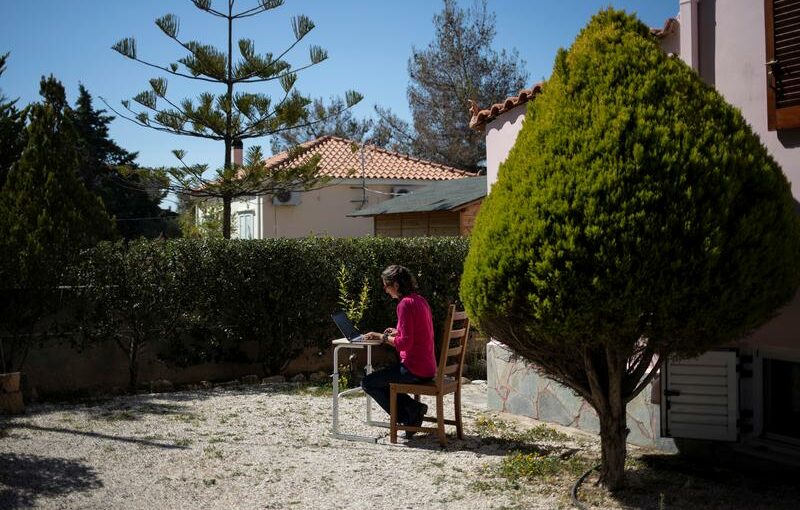AEGINA, Greece (Reuters) – From her garden on a sunny Greek island, Rowena Harding works with governments and charities across the globe.
“The great thing is I can do my job from anywhere,” the Australian-British communications consultant says. “I’m able to talk to clients in Myanmar, clients in Rwanda. This morning I’ve been working on northeast Nigeria, all from here, a Greek island.”
The push to attract a community of footloose remote workers is among the green and digital reforms Greece hopes will help revive its economy and restore its international image after more than a decade of crisis.
It also hopes to boost tourism after the industry’s worst year in decades plunged it back into recession in 2020.
Yet for a country near the bottom of the European Union’s digital economy rankings, the road to becoming a hub for digital nomads – like Bali or Mallorca – is long and strewn with technological and bureaucratic hurdles.
Whether it can succeed just a few years after emerging from the biggest bailout in history will provide a test of Greece’s ability to reshape its economy for a post-pandemic world.
Sitting on a beach near her home, Harding lists the reasons she moved from Thailand to Aegina, one of the Saronic islands a short ferry ride from Athens: low coronavirus infection rates, weather, good food and a nice attitude to enjoying life.
Beyond sun, sea and lifestyle, Greece is planning visas and offering a 50% income tax cut for seven years for professionals who move there. It also wants to lure back some of the 800,000 young Greeks who emigrated during the long downturn that followed the 2009 global financial crisis.
“If you can work from anywhere, why not work from Greece?” Tourism Minister Harry Theoharis told Reuters, citing research estimating a 1.6 billion euro revenue gain for every 100,000 workers who stay for six months.
But despite Greece’s “great potential”, many are staying for weeks, not months, because of problems ranging from slow WiFi to inflexible visa rules, said David Williams, CEO of global housing marketplace NomadX.
While Greece has attracted investment by tech champions Tesla and Amazon, it fares well below European averages on connectivity, internet use and digital public services, standing second to last in the European Commission’s 2020 Digital Economy and Society Index.
Greece’s fixed broadband internet is slower than Tajikistan’s, where just a quarter of the population is online, according to the Speedtest Global Index, which ranked Greece 98th in February.
WORK, PARADISE AND BUREAUCRACY
Last month, Prime Minister Kyriakos Mitsotakis outlined a multi-billion plan dubbed “Greece 2.0” including investments in 5G networks, which Greece began rolling out in December to reinforce its attractiveness.
“You want to be able to look at the sea out of your window as you work, but you want to make sure the laptop is connected,” tourism minister Theoharis said.
Driven by the pandemic, home working is expected to double in 2021, a U.S.-based Enterprise Technology Research survey found.
Eager to compete with Portugal’s Madeira island, which set up a digital nomad village, Greece’s Rhodes launched a Digital Nomads Observatory. On Crete, a project called “Work & Paradise” promises the chance to work from poolside villas.
Without a digital nomads’ registry, it is difficult to determine how many are in Greece. The Facebook group “Digital Nomads Athens” counts 3,600 members from countries including Ireland, France, the United States and Estonia.
Sanne Goslinga, director of talent at Marathon Venture Capital, who moved from Berlin, received several LinkedIn messages from people interested in jobs in Greece.
“Generation Z are risk-takers; they say ‘I’ll just go and see and I can always go back to my country’,” she said, referring to those born between the mid-1990s and early 2010s.
Stefanos Bournias, born in Greece and raised in Bali, moved from Amsterdam last March, working for the Latvian translation software start-up Lokalise.
“A part of me wants to see Greece heal many of its problems, especially with human capital and the brain drain,” the 25-year-old said from a co-working space.
Bournias was initially put off by the lack of opportunities, working conditions and wages. As a foreign resident, he waded through “layers and layers of red tape” on things like getting a military exemption or opening a bank account.
“If you disregard all that and you earn a competitive western European salary, the standard of life here is incredible,” he said.
Still, on NomadsList, which ranks the best places for remote workers, Athens is only 65th in a list topped by Lisbon.
For some, such as Harding, the advantages of Greece outweigh setbacks that she said include power outages. She intends to seek residency.
For others, the future is less certain.
“Right now it’s working for me,” Bournias said. “But I guess I’ll probably be leaving at some point.”
Source: Read Full Article
